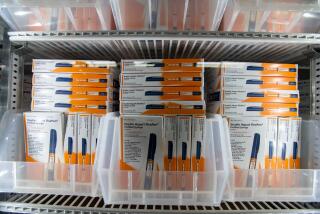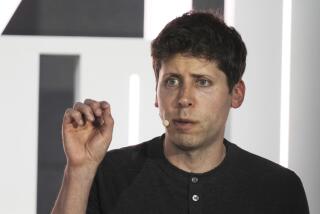Trade Panel Will Probe Amgen Patent Dispute
- Share via
The U.S. International Trade Commission has decided to investigate allegations that Chugai Pharmaceutical Co. of Tokyo is illegally exporting a new biotechnology drug to the United States at the expense of Amgen, a rival biotechnology concern in Thousand Oaks.
Amgen, which claims it has an exclusive U.S. patent on erythropoietin, an anti-anemia drug, filed patent infringement charges in January against Chugai and its American partner, Genetics Institute of Cambridge, Mass.
Since October, Chugai has been manufacturing the drug in Japan, before bringing it into the United States so it can conduct the necessary clinical trials in order to win Food and Drug Administration approval to market the drug.
But Amgen contends that Chugai is producing the drug using genetically engineered techniques that Amgen has both pioneered and patented. Bruce Eisen, a patent attorney for Genetics Institute, denied the charges.
The commission’s investigation could take a year. If the ITC upholds Amgen’s charges, Chugai and Genetics Institute will be barred from selling the drug in the United States, according to a commission investigator.
Race to Be First
The investigation is the latest chapter in the budding rivalry between Japanese and American companies in what is expected to be a multibillion-dollar annual market for biotechnology drugs.
In the case of Amgen and Chugai, they are locked in a race to be the first to market erythropoietin in the United States, a drug that analysts estimate will have a worldwide market of at least $300 million annually.
Biotechnology is the science of reproducing, through gene splicing, large quantities of rare cells so they can be used in drug form.
In Amgen’s clinical tests, EPO has alleviated chronic anemia in patients suffering from kidney disease, while earning glowing reviews in the New England Journal of Medicine. Amgen officials believe that EPO may also be useful in treating cancer patients undergoing chemotherapy.
“Chugai and Genetics Institute are two years behind Amgen and in the drug industry that’s an eternity,” said Peter Drake, an analyst with Kidder, Peabody & Co. in New York. “Amgen is clearly first and it will clearly dominate the world market,” Drake said.
Drake said Amgen is only months away from winning FDA approval for EPO. Being first to market may give that company a near-monopoly on the drug in the United States.
“This is an important race we expect to win,” said Robert Weist, Amgen’s general counsel. “We are entitled to exclusivity in the United States by virtue of our important and pioneering contributions.”
Dispute Over Process
At the core of the dispute are two EPO patents, one issued to Amgen and another to Chugai.
Chugai has a patent that covers purified EPO--the form of EPO, a human hormone, found in very small quantities in blood and urine. But Amgen’s patent covers the gene-splicing methods necessary to mass-produce the hormone into a drug form.
Amgen claims that Chugai is using Amgen’s patented process, while Chugai claims that its patent covers EPO regardless of how it is produced. However, patent law in the 15-year-old biotech industry remains murky and unchartered.
In its complaint to the trade commission, Amgen said it “has taken all of the risks,” while Genetics Institute and Chugai “plan to take a free ride on Amgen’s already proven successful results.”
Other Japanese companies, including Mitsubishi Chemical Industries and Suntory Ltd., have also begun major biotechnology research campaigns.
But unlike previous Japanese versus American clashes in the marketplace, when the likes of General Motors went head to head against Toyota and Nissan, most of the American biotechnology firms are small and often undercapitalized.
Analysts expect Chugai to post about $850 million in sales for 1987. By comparison, Amgen had sales of $38.8 million and profits of $1.2 million for the nine months ended Dec. 31. But most of Amgen’s revenue is derived from cash advances made by the company’s various research partners.
Called “Japan-Bashing”
Amgen believes that it needs protection by the federal government against unfair competition by its bigger Japanese rivals. In its complaint, Amgen said Chugai’s claim to the product is “part of a Japanese effort to penetrate and ultimately dominate the nascent U.S. biotechnology industry.”
Genetics Institute’s Eisen said Amgen’s complaint is hyperbole. “This is rather sexy because it’s biotech and it’s Japan-bashing,” he said. “Amgen is just trying to ride a wave of anti-Japan fervor.”
He notes that one of Amgen’s partners is Japan’s Kirin Brewery, which will have the rights to market Amgen’s EPO drug in Japan.
Although Chugai and Genetics Institute may be too far behind to capture much of the EPO market in the United States, analysts believe that the companies’ real motive may be to settle for a joint venture or cross-licensing patent agreement with Amgen. The lawsuits between the companies could drag on for years.
“The only obvious way to settle this is with an agreement,” Eisen said. “But Amgen, on an irrational basis, has decided it doesn’t want to settle. They have declared war.”
More to Read
Inside the business of entertainment
The Wide Shot brings you news, analysis and insights on everything from streaming wars to production — and what it all means for the future.
You may occasionally receive promotional content from the Los Angeles Times.










